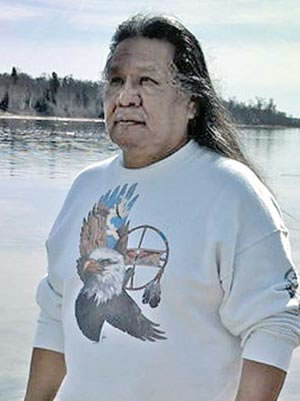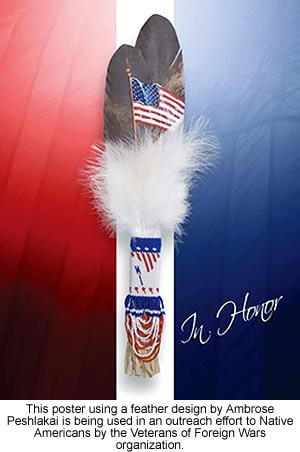 |
Canku Ota
|
 |
|
(Many Paths)
|
||
|
An Online Newsletter
Celebrating Native America
|
||
|
June
1, 2011 - Volume 9 Number 6
|
||
|
|
||
|
Diné
Artist's Design Becoming a Symbol for Native America Veterans
|
||
|
by Cindy Yurth - Tséyi'
Bureau Navajo Times
|
||
 Symbols
are powerful things. The best ones capture people's imaginations and
rally them to action. Symbols
are powerful things. The best ones capture people's imaginations and
rally them to action.
For a Diné‚ artist living in Michigan, the fact that one of his designs is rapidly becoming a national symbol for Native veterans represents a high point in his career - a career that, 25 years ago, was dangerously on the skids. "I've had stuff in a lot of Indian markets and won a lot of blue ribbons," said Ambrose Peshlakai, 56, of Baraga, Mich., who is Honagh‡anii (One Who Walks Around People Clan), born for Kinya'‡anii (Towering House Clan). "But the fact that my art is being used to help people, that's the real stamp of approval. That means I've arrived as a Native artist." Pesklakai, a former alcohol and drug counselor, has been making his living as an artist for 13 years. He had done sculpture, painting and beadwork for years, and had recently been venturing into decorative feather fans of the type used by powwow dancers (although Peshlakai uses feathers from domestic fowl rather than eagles, since his works are strictly for art's sake and not ceremonial). One day, thinking of his code talker uncle, Francis Thompson, Peshlakai set out to make a patriotic fan. He bound two feathers together and painted an American flag on them, then wove a beadwork handle with a motif from the West Point Academy shield.
The work, which Peshlakai had titled "The Shield," immediately caught Eubank's attention. He had been trying to do more outreach to Native American veterans. "Is there some way to reproduce it?" he asked Peshlakai. "Maybe as a poster?" Peshlakai took the fan to a friend who had a photo studio. He photographed it and placed the image against red, white, blue and tri-colored backgrounds, then added the words "In Honor" at the bottom. Eubank loved it, and when Peshlakai showed it to the Potawatomi tribal government, they did too. Eventually it was picked up by Tribal Umbrella, a collaboration of 12 local tribes and American Indian Health and Family Services that offers services in Michigan's Upper Peninsula. A picture of The Shield against a blue background adorns a new brochure for Access to Recovery, Tribal Umbrella's drug and alcohol treatment program for Native veterans and active-duty military personnel. There couldn't be a more perfect way to complete a circle in Peshlakai's life. There was a time he could have used Access to Recovery himself. |
|
|
||
|
|
||
| Canku Ota is a free Newsletter celebrating Native America, its traditions and accomplishments . We do not provide subscriber or visitor names to anyone. Some articles presented in Canku Ota may contain copyright material. We have received appropriate permissions for republishing any articles. Material appearing here is distributed without profit or monetary gain to those who have expressed an interest. This is in accordance with Title 17 U.S.C. Section 107. | ||
|
Canku Ota is a copyright ©
2000, 2001, 2002, 2003, 2004, 2005, 2006, 2007, 2008, 2009, 2010,
2011 of Vicki Barry and Paul Barry.
|
||
 |
 |
|
|
The "Canku
Ota - A Newsletter Celebrating Native America" web site and
its design is the
|
||
|
Copyright ©
1999, 2000, 2001, 2002, 2003, 2004, 2005,
2006, 2007, 2008, 2009, 2010, 2011
of Paul C. Barry.
|
||
|
All Rights Reserved.
|
||
 It
was on display at the Hannahville (Mich.) Indian Community's headquarters
when Richard Eubank, the national commander of the Veterans of Foreign
Wars, happened to visit.
It
was on display at the Hannahville (Mich.) Indian Community's headquarters
when Richard Eubank, the national commander of the Veterans of Foreign
Wars, happened to visit.